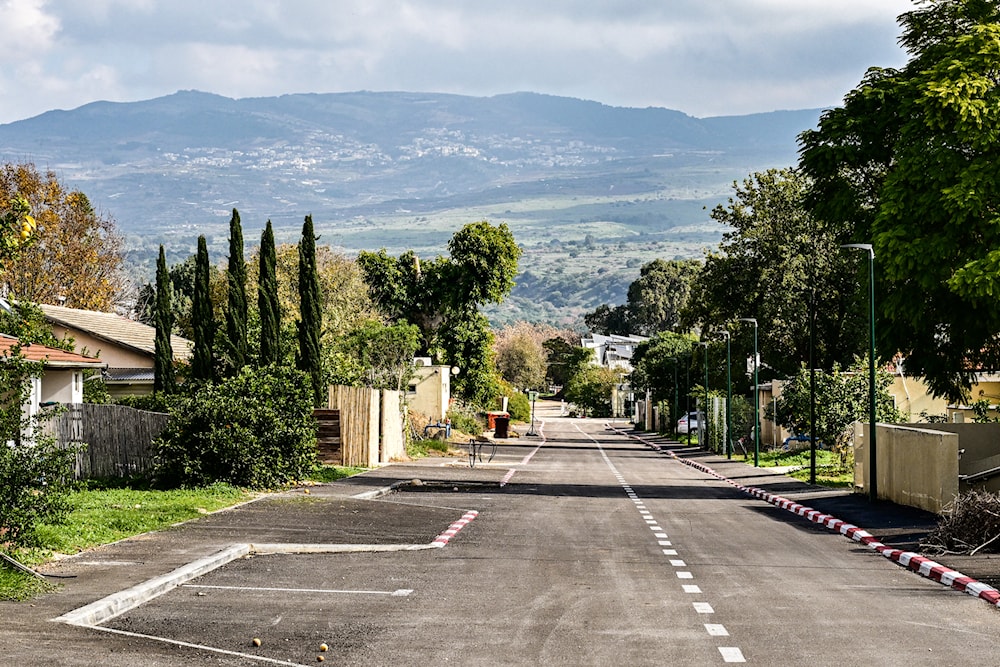Israeli settlers fear new kind of war with Hezbollah: Washington Post
A Washington Post report says the Israeli assassination of Hamas deputy chief Saleh al-Arouri in Beirut heightens fears of an all-out war.
-

This picture taken on January 4, 2024, shows a view of an empty street in the evacuated Kibbutz "Dafna" in northern occupied Palestine, about a kilometer away from the border with Lebanon. (AFP)
A report published in The Washington Post addressed the crisis faced by Israeli settlers amid the military escalation on the northern front with Hezbollah in Lebanon for about three months, which has led thousands of them to evacuate their settlements, fearing Resistance operations.
"This is not an official war zone. Yet explosions from Israeli artillery and Hezbollah missiles echo across the rock-strewn mountains nearly every day," the report read.
David Shtift, an Israeli settler in Kibbutz "Eilon", was quoted as saying, "What happened in the south [i.e in Gaza] was exactly what we were saying could happen here [in northern Palestine], and still could."
"It’s real," Shtift said.
The report claimed that at least 70,000 Israeli settlers had evacuated settlements in the north in the wake of the operations of the Islamic Resistance in Lebanon, turning the area into a closed military zone. It noted that several Israeli battalions comprising thousands of soldiers have been deployed there instead.
According to the Post, the Israeli assassination of the Deputy Head of the Political Bureau of Hamas, Saleh al-Arouri, in Beirut "heightened fears in the region that the skirmishes along this volatile borderland could explode into all-out war."
The report noted that "Israel" regards Hezbollah "as a proper army with sophisticated training and an arsenal of some 150,000 missiles," adding that many Israeli settlers fear that the Israeli government is, once again, underestimating a deadly threat.
The Washington Post report highlighted that northern Israeli settlers who evacuated the area "have been given few answers about the state of their homes or a timeline for when they will be able to return."
"Until Oct. 6, we were seen as the sheriff of the Middle East. After Oct. 7, we are being viewed as having lost our capability to deter," Moshe Davidovich, the head of an Israeli council in northern occupied Palestine, was quoted as saying.
In the same context, the report touched on the idea of establishing buffer zones, akin to the ones during "Israel's" occupation of southern Lebanon from 1985 to 2000, extending approximately four kilometers inside southern Lebanon and several kilometers within Gaza.
Yossi Harpaz, a sociologist at "Tel Aviv" University, noted a paradigm shift in "Israel's" defense perception and the role of its northern settlements post-October 7.
Harpaz mentioned that the buffer zone has shifted to occupied Palestinian territory, now inhabited by Israeli soldiers instead of settlers, violating the Israeli military's doctrine of conducting military operations in "the territory of the enemy.”
The report also cited Noam Erlich, who operated a craft beer company in Kibbutz "Manara" -evacuated for the first time on October 8 - as emphasizing the strategic significance of "frontier Kibbutzim" like "Manara" for "national security".
Erlich warned that "if Manara goes, then the next border line will be Kiryat Shmona."
"Slowly, Israel’s northern border will reach Tel Aviv," he added.
Read more: Unsure 'Israel' will be able to fight Hezbollah: Ex-Mossad officials

 3 Min Read
3 Min Read








